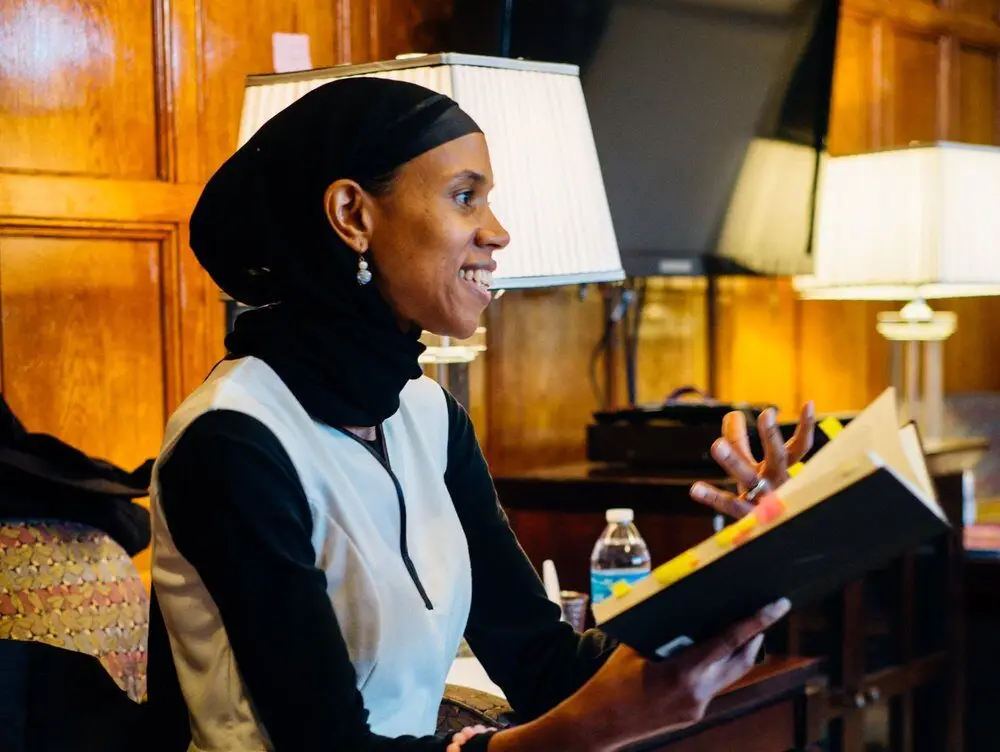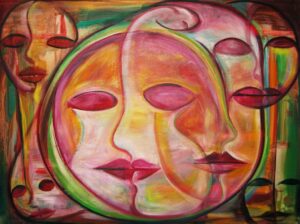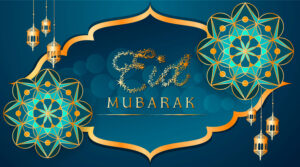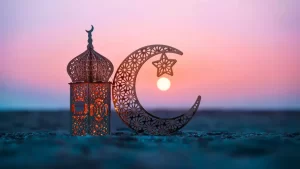
Jamillah Karim: Islamic Women, Islamic Feminism
An interview of Dr. Jamillah Karim, exploring her life and her views on women in Islam.Jamillah Karim—where do I start?Armed with a Ph.D. in Islamic Studies from Duke University and a lifetime commitment to the faith, Jamillah moved quickly to her current role as an assistant professor of religion at Spelman College. Her teaching, writing, research, and ample public speaking centers around nothing less than Muslims in the U.S., immigration, race, class, religious spaces and communities, and Islamic feminism.She’s the author of several published articles including “To Be Black, Female, and Muslim: A Candid Conversation about Race in the American Ummah” and “Through Sunni Women’s Eyes: Black Feminism and the Nation of Islam.” As well, Jamillah contributes regularly to Azizah, an American Muslim women’s magazine.These days, Jamillah [is promoting] a book on how African American and South Asian immigrant Muslims relate to each other, specially focusing on women’s experiences.Here’s Jamillah:
As An Undergrad At Duke University, You Studied Electrical Engineering. How Did You Come To Be A Leading Islamic Studies Scholar, Focusing On Gender And Race?
Since high school, I have had a passion to teach Islam to the American public. Growing up in an African American Muslim community, I witnessed how Islam has had a positive impact on black communities in general, and especially on women. My mother, and the other women in my community who taught me, shared some of the same struggles as other black women, i.e., taking care of children while going to school and working, some of them divorced, some married. They were strong and God-fearing, and their faith and discipline helped them to achieve great things despite their humble beginnings. My mother, for instance, went back to school when the youngest of her four children was two years old. She’s divorced now, has never remarried because she hasn’t found a man worthy (it’s been 18 years), works as a project manager in an international consulting firm, and loves to do community work. My mother is an amazing role model.By my senior year in college, I realized that my passion was to teach and write about the amazing community of women that I grew up around. There were graduate students in Islamic Studies at Duke who exposed me to the possibility of graduate studies in Islam, and I thought, ‘I want to be like them.’ So I decided that I would complete my engineering degree but would pursue a Ph.D. in Islamic Studies. With African American Muslims, especially women, as my main area of research, it was inevitable that I would become a scholar of religion, race, and gender.
As A Professor At A Historically Black Women’s College, Can You Talk About What Role Such A School Plays Today, Both In The Lives Of Young Black Women And In Higher Education Overall? What Has Your Experience Been Like As A Spelman College Professor?
I love Spelman! I’ve always wanted a profession in which I felt that I was making a difference. Spelman has an amazing legacy of producing black female scholars and leaders. My grandmother and aunt, both educators, attended Spelman. Spelman is important because we live in a world that does not take seriously the struggles of black women. We can thrive in many places, like I did at Duke. But we need places committed to the experiences and education of black women. Also, it is vital that black communities produce our own institutions because at the end of the day, we are responsible for our own future. Spelman is a model of the kinds of institutions we need to continue to build.I could teach anywhere; however, I feel that I truly make a difference at Spelman. Students at any institution do best when they can relate to the professor, when they feel excited and passionate about their courses. I believe that because I am a young, black woman, my students relate to me more than they might relate to other professors teaching Islam. I think that I offer a lot to Spelman; at the same time, Spelman offers me so much, allowing me to be a part of this amazing legacy of educating black women.
Can You Talk About The Significance Of Islam In Your Own Life?
Islam is at the center of my life. It is my pathway to becoming, what one great Muslim scholar, al-Ghazali, described as being god-like. He described this state as follows: it means that “one’s heart and aspiration be taken up with God—great and glorious, that he or she not look towards anything other than God nor pay attention to what is not God, that one neither implore nor fear anyone but God.” This means that whatever I do, including my scholarly work, I begin it with the intention to please and serve God.
You Investigate What It Means To Negotiate Islamic Ideals Of Community (Ummah) Against America’s Race And Class Divisions. What Have You Discovered?
Muslims in America are affected by race and class divides in the United States. The majority of converts to Islam are African Americans, and the majority of Muslim immigrants to the United States are of South Asian (Indian, Pakistani, Bangladeshi) and Arab descent. This means that the American ummah (Muslim community) is made up largely of African Americans and immigrants, although whites and Hispanics are steadily joining the American ummah. Immigrants tend to live in affluent white suburbs, and African American Muslims in black neighborhoods. As a result, African Americans tend to worship in mosques separately from South Asian and Arab immigrants. At the same time, I have found that there are a growing number of sites in which African American and immigrants come together because of their shared Muslim identity. This is happening especially on college campuses where African American and second-generation immigrant Muslims participate in Muslim student organizations and form lifelong friendships. Although Muslims are affected by the racialized residential patterns that I mentioned above (white vs. black neighborhoods), I believe that the Muslim community has a special potential to cross race and class boundaries and emerge as a model of cosmopolitan community.
How Do Women Fit Into The Historical Muslim Tradition?
Women have played a key role in the historical Muslim tradition. The first convert to Islam was a woman, the Prophet Muhammad’s wife Khadijah. She supported the Prophet financially and emotionally during the early part of his prophecy when the early Muslim community faced religious persecution. A later wife of the Prophet, ‘Aisha, played a pivotal role in the memorization and transmission of the Prophet’s words and traditions, peace be upon him. Without these traditions, there would be a great omission in Muslim thought and practice.Muslim women played an integral part of the community and the transmission of sacred knowledge in the early period (the 7th century). However, as Islam expanded beyond the Arabian Peninsula into Persia, it was embraced by cultures in which women did not enjoy a prominent role, as was the case for many medieval cultures. Women’s contributions to the Muslim tradition became less dominant during this period, again, because of culture and not because of the precedent that the Prophet Muhammad set. Today, Muslim women across the globe are reclaiming the legacy of Muslim women’s contribution in Islam, and some are identifying themselves as Islamic feminists.
How Do Mosques Conflate As Both Religious And Cultural Spaces, And How Do Women Of Color Fit Into These Spaces?
At least two-thirds of mosques in the United States dominate in one ethnic group, either African American or South Asian. The remaining one-third tends to be a combination of Arab and South Asian Muslims. Mosques, therefore, function as cultural or ethnic spaces. Most women have no problem finding a mosque that fits their cultural or ethnic experience. However, immigrant mosques are more likely to have prayer spaces in which men and women are separated by a wall or curtain. Some women feel uncomfortable in these spaces, especially African American women, but also do first and second-generation immigrant women.
How Have African American Muslim Women Situated Themselves Within Black Feminism? How Has Feminism Been Influenced By Muslim Women? What Is Islamic Feminism?
Most African American women do not identify themselves as feminists because of the range of meanings that the term evokes, including the notion that feminism teaches women that they do not need men. Many African American Muslim women are independent, i.e., they are divorced; however, they believe in the ideal of strong families in which men function as leaders and financial supporters. When I write about African American Muslim women, I do situate much of their thought and practice within Black feminism, particularly the dimension of Black feminism that emphasizes feminism as resistance to all forms of injustice, not just gender inequalities. Like other black women, African American Muslim women experience gender discrimination that intersects with discrimination based on race and class. Also, Black feminism’s focus on family and elevating the entire community—women, men, and children—resonates with black Muslim women.Feminism has been influenced by Muslim women in much the same way that it has been influenced by nonwhite women. Muslim women, like other minority women, challenge narrow definitions of feminism. In particular, Muslim women prove that one can be committed to faith and still act as a feminist. Muslim women broaden feminism.Islamic feminism is feminist thought and practice derived within an Islamic framework. Muslim women do not have to look beyond their faith tradition to acquire gender consciousness and to fight against gender injustices. The Qur’an and the precedent of the Prophet Muhammad, prayers and peace be upon him, inspire and inform their feminist practice. This, however, does not mean that other forms of feminism do not influence Muslim women’s feminism. Rather, feminisms intersect to influence Muslim women’s activism.Islamic feminism also fights against other injustices that affect Muslim women, particularly anti-Muslim racism.Muslim women are hyper-mediated in the mainstream U.S. news cycle. Particularly, secluded women in hijabs were held up as the epitome of oppression that, in part, supposedly justified war a few years ago. Your work focuses on the gender roles of American Muslims. What’s your response to the political characterization of Muslim women overseas, and how does it compare to Muslim women in our own borders? I always make it clear that the characterization of Muslim women, especially overseas, is political. The way in which imperial feminists have supported the characterization of Muslim women as backwards to justify the occupation of Muslim lands partly explains why many Muslim women are suspicious of feminism and often choose not to use the label feminist. This is another reason why the qualifier ‘Islamic’ is so important because it distances Muslim women from imperial feminism.Certainly, there are gender inequalities in Muslim-majority countries; but many scholars have demonstrated that Muslim women have challenged these inequalities through indigenous feminist paradigms. Western feminists can never fully address the concerns and issues of Muslim women, especially those living overseas, because gender activism must always emerge from within the culture it addresses in order for it to be most effective.Muslim women’s experiences in American borders are certainly different from their experiences abroad. Many immigrant women are claiming their rights for the first time in the United States. However, some of the earliest and most effective Islamic feminist movements have occurred outside the United States. Also, Muslims live across diverse regions of the globe, so we must be careful not to lump Muslim women’s experiences overseas. Muslim women’s experiences in Ghana are drastically different from their experiences in Kuwait. But generally, Muslim women in the United States are highly educated and active in their communities, Muslim and non-Muslim.
In “To Be Black, Female, And Muslim: A Candid Conversation About Race In The American Ummah” You Wrote: “While Both African Americans And Immigrants Contribute To These Divides, This Article Shows How Immigrant Muslims Enjoy A Level Of Privilege And Power Over African American Muslims.” Can You Expand On This?
Muslim immigrants are socialized to respond to African Americans in ways that most immigrants to the United States are—that is, distancing themselves from African Americans, especially their neighborhoods, as part of assimilating into the dominant white culture. In the process, they become complicit in anti-black racism. Even though they don’t enjoy white privilege as whites do, they do acquire some benefits as they seek to claim whiteness. This is the major way that I see immigrant privilege. Also, immigrant Muslims come from multi-generation Muslim families and cultures, and, therefore, tend to imagine themselves as better Muslims over African Americans, who are largely a community of converts and their Muslim-born children. When African Americans have had negative experiences with immigrants, they tend to ascribe this bad behavior to all immigrants even though it does not represent them all.
RESOURCES:
“Challenges Facing American Muslim Women.” By Samer Hathout. Islam for Today.Azizah Magazine“These women produce a magazine that reflects the experiences and perspectives of Muslim women living in North American society. “Muslim Women’s League
“…a non-profit Muslim American organization working to implement the values of Islam and thereby reclaim the status of women as free, equal and vital contributors to society.”“The Feminist Movement and the Muslim Woman.” By Maryam Jameelah. Islam 101.





